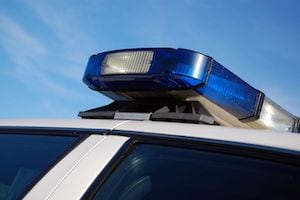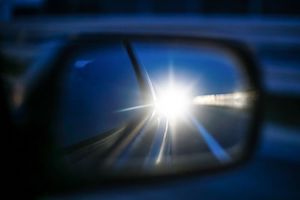North Carolina Criminal Law 20-157: Failure to Stop for Blue Light and Siren
 North Carolina General Statute 20-157 mandates motorists submit to the show of authority, with certain exceptions, and “immediately drive” to position to the side of the roadway upon the activation of a blue light and siren.
North Carolina General Statute 20-157 mandates motorists submit to the show of authority, with certain exceptions, and “immediately drive” to position to the side of the roadway upon the activation of a blue light and siren.
Defense lawyers may refer to such offenses, as they pertain to law enforcement and the NC traffic laws as, “Failure to Heed” or “Failure to Stop for Blue Light” offenses.
The statute is broadly written to include more than police officers and law enforcement personnel employed by the State Highway Patrol and/or local towns, cities, and municipalities.
20-157 also applies to designated vehicles operating emergency equipment (blue lights, sirens, horns, and bells) in the official course of their duties and during an emergency:
- Rescue personnel, including ambulances, fire trucks, and EMT
- NC Department of Environmental Quality
- Parks and Recreation Division of the NC Department of Natural and Cultural Resources
- NC Forst Service
The State of North Carolina bears the burden of proof in all criminal matters, including proving to the legal standard Beyond a Reasonable Doubt violations of Chapter 20 Motor Vehicle offenses.
The State must present sufficient evidence of prima facie elements of the offense, including:
- The accused (the Defendant) operated a motor vehicle
- On a highway located in the State of North Carolina
- In a town, city, county, or municipality within the Court’s jurisdiction
- The Defendant operated the vehicle as a law enforcement vehicle approached
- While traveling the law enforcement vehicle displayed (activated) a blue emergency/warning light
- The law enforcement vehicle also sounded a siren
- That such siren “under normal conditions” could be audible (heard) from a distance of 1,000 feet or more (not less than one thousand feet)
- The Defendant did not immediately drive (pull over)
- Parallel to the side of the roadway, curb, edge of the highway
- Clear of intersections
- Stop and remain stopped
It is not a violation to move your vehicle after the police, fire, medic, or other emergency vehicles “shall have passed.” Motorists, once stopped may move if directed otherwise by a “traffic officer,” law enforcement officer, or other emergency personnel to move your vehicle.
Vehicles traveling in the opposite direction, subject to certain restrictions, are not necessarily required under the law to stop upon the display/activation of a blue light and siren.
2. Examples of Failure to Stop for Blue Light and Siren1. The Defendant is driving on the “inner loop” of Interstate 485 in Charlotte, North Carolina. Highway 485 is a four lane, divided highway, with a grassy median and concrete “Jersey barriers” in the center. A Charlotte-Mecklenburg Police Officer, traveling in the opposite lane of travel observes the Defendant’s vehicle traveling (speeding) 82 m.p.h. in a 70 m.p.h. zone. In response, the CMPD Officer activates the police cars emergency equipment, including blue lights, strobes, “wig wags” and the patrol vehicle siren. Thereafter, approximately one mile down the highway, the CMPD Officer exits I-485, crosses over the highway, and re-enters I-485 in pursuit of the Defendant. The Defendant neither sees the police officer, the vehicle blue lights, nor hears the officer’s siren until the patrol car is directly behind the Defendant’s vehicle.
Defendant cannot be convicted for Failure to Stop for Blue Light and Siren for several reasons. The Defendant had no duty to stop for blue light and siren, as Chapter 20-157 specifically excludes such divided highways and vehicles traveling in opposite directions.
3. Related OffensesOther related crimes, offenses, and legal issues include:
- Careless Driving
- DMV License Insurance Points
- Failure to Obey Traffic Laws
- Hit and Run Charges: Hit and Run Consequences
- NC DMV Hearings
- DWI Fatality Charges
Legal defenses and challenges may include things like:
- No legal duty to stop
- Inability to see or hear Blue Light and Siren
- Inability/Impossibility to immediately stop
- N.C.G.S. 20-157 is a traffic law statute that uses possibly overly broad and/or vague language including terms such as:
- “Ordinary Conditions”
- “Drive Immediately”
- “Highway”
The Statute also fails to take into account safety issues and concerns of the driver when it is uncertain an actual law enforcement officer is attempting to effectuate a traffic stop and/or require motorists to pull over to side of the roadway or curb of a highway.
5. Penalties Under North Carolina Criminal Law 20-157: Failure to Stop for Blue Light and Siren, with nothing more, is ordinarily a Class 2 Misdemeanor. Under the NC Misdemeanor Punishment Chart, the maximum period of incarceration for Class 2 Misdemeanors is 60 days.
Under North Carolina Criminal Law 20-157: Failure to Stop for Blue Light and Siren, with nothing more, is ordinarily a Class 2 Misdemeanor. Under the NC Misdemeanor Punishment Chart, the maximum period of incarceration for Class 2 Misdemeanors is 60 days.
Punishments under the sentencing guidelines in North Carolina authorize:
- Active Punishment (incarceration)
- Intermediate Punishment (including a special term of incarceration or “split sentence”)
- Suspended Sentence (including probation)
Felony punishments are also authorized pursuant to N.C.G.S. 20-157 in the event the Defendant’s failure to Stop for Blue Light and Siren causes death or serious injury to a firefighter, law enforcement officer, emergency personnel operating an emergency vehicle, public service vehicle operator, Incident Management Assistance Patrol member, or “any other emergency response person in the immediate area” of the public service vehicle or authorized emergency vehicle.
N.C.G.S. 20-157 authorizes Felony Punishment as a Class I Felony, carrying a maximum period of incarceration of 24 months in the North Carolina Department of Public Safety.
The Felony Punishment Chart provides for Intermediate/Active punishment as a Prior Record Level VI Offender. **Sentencing in North Carolina under the NC Punishment Grid is notoriously complex. If you have individual questions about the best-case and worst-case scenarios for your criminal charges, consult with legal counsel immediately.
6. Criminal Defense for Criminal Traffic Law ViolationsFailure to Heed Blue Light cases are often accompanied with other criminal charges such as:
We believe effective defenses are assisted when legal counsel (criminal lawyers) get involved early-on in the process.
CALL NOW to schedule your free consultation: 704-342-4357 or email Bill Powers at: Bill@CarolinaAttorneys.com
 Powers Law Firm PA Home
Powers Law Firm PA Home


















